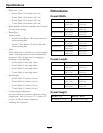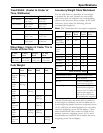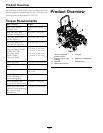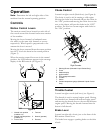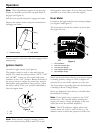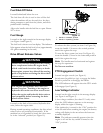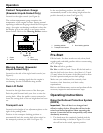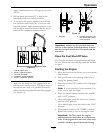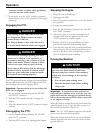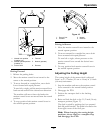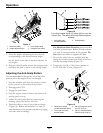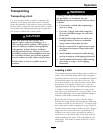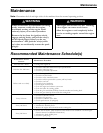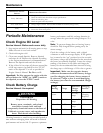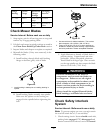
Operation
attempts. Failure to follow these guidelines
can burn out the starter motor.
7. If the choke is in the “ON” position, gradually
return choke to the “OFF” position as the engine
warms up.
Engaging the PTO
DANGER
The rotating blades under the mower deck
are dangerous. Blade contact can cause
serious injury or kill you.
Do Not put hands or feet under the mower
or mower deck when the blades are engaged.
DANGER
An uncovered discharge opening will allow
objects to be thrown in an operator’s or
bystander’s direction. Also, contact with the
blade could occur. Thrown objects or blade
contact can cause serious injury or death.
Never operate the mower with the discharge
deector raised, removed, or altered unless
there is a grass collection system or mulch
kit in place and working properly.
The PTO push-pull switch engages the cutting blades.
Be sure that all persons are clear of the mower deck
and discharge area before engaging PTO.
Important: Operator must be in seat before the
PTO can be engaged.
1. Set the throttle midway between the “SLOW”
and “FAST” positions.
2. Pull the PTO switch outward to engage the
blades.
3. Place the throttle in the “FAST” position to begin
mowing.
Disengaging the PTO
1. Set the throttle midway between the “SLOW”
and “FAST” positions.
2. Push the PTO switch in to disengage the blades.
Stopping the Engine
1. Bring the unit to a full stop.
2. Disengage the PTO.
3. Move the motion control levers out to the neutral
lock position.
4. Engage the parking brake.
5. Place the throttle midway between the “SLOW”
and “FAST” positions.
6. Allow the engine to run for a minimum of 15
seconds, then turn the ignition switch to the
“OFF” position to stop the engine.
7. Remove the key to prevent children or other
unauthorized persons from starting engine.
8. Close the fuel shut-off valve, located behind and
below the seat, when the machine will not be in
use for a few days, when transporting, or when
the unit is parked inside a building.
Driving the Machine
CAUTION
Machine can spin very rapidly by positioning
one lever too much ahead of the other.
Operator may lose control of the machine,
which may cause damage to the machine
or injury.
• Use caution when making turns.
• Slow the machine down before making
sharp turns.
Important: To begin movement (forward or
backward) the operator must be in the seat, the
brake lever must be disengaged (pushed down)
before the motion control levers can be moved in
or the engine will stop.
When the motion control levers are positioned fully
outward (apart) in the T-slot, the drive system is in
the neutral lock position (Figure 15).
Note: The “N” LCD indicator appears when both
levers are in the neutral lock position.
When the motion control levers are moved directly
inward (together) the drive system is in the neutral
operate position.
24



